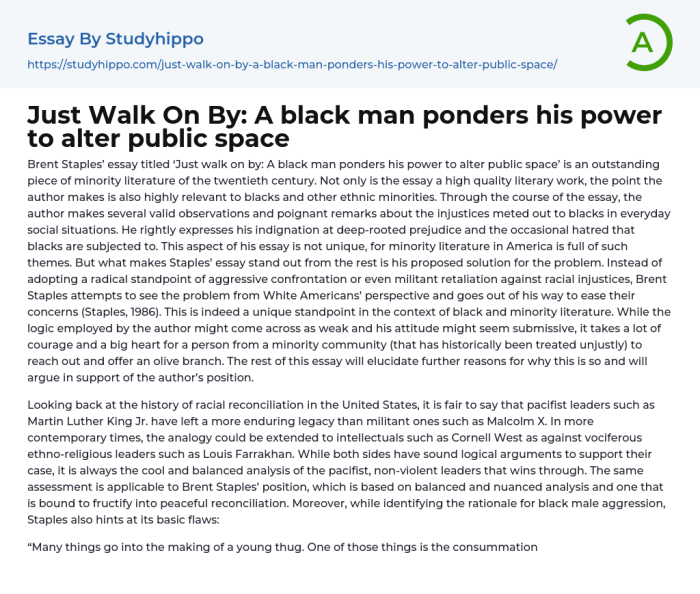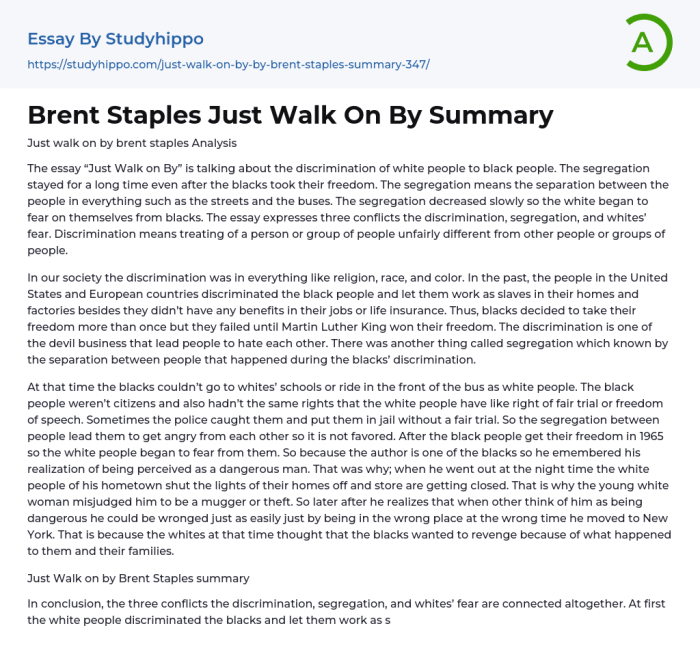Brent staples just walk on by – Brent Staples’ powerful personal narrative, “Just Walk on By: A Black Man Ponders His Power to Alter Public Space,” has ignited a crucial dialogue about racial profiling and its pervasive impact on society. Staples’ poignant account of his experiences as a young black man navigating public spaces, where his mere presence often triggered fear and anxiety, has resonated deeply with readers and sparked a broader conversation about the ways in which race shapes our perceptions and interactions.
Staples’ narrative not only highlights the psychological toll of being perceived as a threat but also exposes the power dynamics at play in public spaces. His experiences underscore the responsibility we all share in challenging stereotypes and promoting inclusivity, ultimately creating more equitable and welcoming environments for all.
Brent Staples: Personal Narrative

Brent Staples’ personal narrative, “Just Walk on By: A Black Man Ponders His Power to Alter Public Space,” is a powerful and moving account of the experiences of a black man in America. Staples describes how, as a young man, he was often stopped by police officers and harassed by white people simply because of his race.
He writes about the fear and anger he felt, and the ways in which he learned to cope with the racism he faced.
Significance of the Narrative
Staples’ narrative is significant because it provides a first-hand account of the experiences of black people in America. It helps to dispel the myth that racism is a thing of the past, and it shows how the legacy of slavery and segregation continues to affect the lives of black people today.
Brent Staples’ “Just Walk on By” highlights the experiences of black men navigating public spaces while facing racial profiling. Similarly, in “C Bethany Lau 2016 Answer Key,” c bethany lau 2016 answer key , Lau explores the intersection of race, gender, and power dynamics in society.
Both works emphasize the need to challenge preconceived notions and address the impact of societal biases on individuals.
The narrative also provides a valuable perspective on the issue of police brutality, and it helps to explain why so many black people are distrustful of law enforcement.
Impact on Society and Relevance to Contemporary Issues
Staples’ narrative has had a significant impact on society. It has been widely read and discussed, and it has helped to raise awareness of the issue of racism. The narrative has also been used as a teaching tool in schools and universities, and it has helped to educate people about the experiences of black people in America.
The narrative remains relevant to contemporary issues, as racism continues to be a problem in America today. The recent killings of unarmed black men by police officers have sparked a national conversation about race and racism, and Staples’ narrative provides a valuable context for understanding these events.
Racial Profiling and Perception

Racial profiling, the practice of targeting individuals for suspicion or detention based solely on their race or ethnicity, is a persistent and harmful issue in many societies. This discriminatory practice not only violates the rights of individuals but also has profound psychological and social consequences.
One of the most insidious effects of racial profiling is the way it perpetuates stereotypes and reinforces negative perceptions of certain racial groups. When people of color are disproportionately stopped, questioned, or searched by law enforcement, it sends a message that they are inherently more suspicious or dangerous than others.
This can lead to a cycle of fear and mistrust, where people of color feel like they are constantly under surveillance and subject to unfair treatment.
Psychological Effects of Racial Profiling
The psychological effects of racial profiling can be devastating. Studies have shown that people who are frequently profiled experience higher levels of stress, anxiety, and depression. They may also be more likely to develop negative self-perceptions and feelings of isolation and alienation.
In some cases, racial profiling can even lead to post-traumatic stress disorder (PTSD).
Fear and Anxiety

Fear and anxiety are powerful emotions that can shape our perceptions of the world and our interactions with others. In public spaces, fear and anxiety can lead to a heightened sense of awareness and a tendency to view others as potential threats.
This can lead to prejudice and discrimination, as people may make assumptions about others based on their appearance or behavior.
Prejudice and Discrimination, Brent staples just walk on by
Fear and anxiety can lead to prejudice, which is a negative attitude towards a person or group based on their perceived membership in a particular category. Discrimination is the unfair treatment of a person or group based on their perceived membership in a particular category.
Prejudice and discrimination can have a devastating impact on individuals and communities, leading to social isolation, economic hardship, and even violence.
Power and Responsibility

Public spaces are often shaped by power dynamics, particularly those related to race. Individuals in positions of power, such as law enforcement officers, may hold preconceived notions about certain racial groups, leading to biased perceptions and interactions.
In such situations, it becomes imperative for individuals to challenge stereotypes and promote inclusivity. By recognizing and confronting biases, we can create a more just and equitable society.
Responsibility of Individuals
- Challenge stereotypes: Question assumptions and prejudices based on race, ethnicity, or other characteristics.
- Educate oneself: Seek out information and perspectives that challenge existing beliefs and broaden understanding.
- Speak up against injustice: Report or challenge discriminatory behavior, even when it is uncomfortable.
- Foster inclusive environments: Create welcoming and respectful spaces where individuals from all backgrounds feel valued and included.
Solutions and Strategies: Brent Staples Just Walk On By

Addressing racial profiling and its consequences requires a multifaceted approach involving both individual and societal changes. Creating more equitable and inclusive public spaces demands a commitment to understanding and challenging biases, promoting diversity, and fostering a sense of belonging for all.
Community-Based Initiatives
- Dialogue and Education:Engaging in open and honest conversations about racial profiling, its impact, and the experiences of those affected can help break down stereotypes and build empathy.
- Community Watch Programs:Involving community members in neighborhood safety initiatives can foster a sense of shared responsibility and reduce the likelihood of biased policing.
- Mentoring and Support:Providing mentorship and support programs for young people of color can help them navigate potential encounters with law enforcement and develop positive relationships with police officers.
Law Enforcement Reforms
- Implicit Bias Training:Implementing mandatory implicit bias training for law enforcement officers can help them recognize and address their unconscious biases.
- Body Cameras and Accountability:Equipping police officers with body cameras and holding them accountable for their actions can provide transparency and reduce the likelihood of racial profiling.
- Independent Review Boards:Establishing independent review boards to investigate allegations of racial profiling can ensure impartial oversight and foster public trust.
Policy and Legislation
- Data Collection and Analysis:Collecting and analyzing data on police encounters can help identify patterns of racial profiling and inform policy changes.
- Anti-Profiling Laws:Enacting anti-profiling laws that prohibit law enforcement from using race or ethnicity as a basis for stops, searches, or arrests can help deter biased policing.
- Investment in Community Policing:Increasing funding for community policing programs that prioritize building relationships between law enforcement and the communities they serve can foster trust and reduce tensions.
FAQ Resource
What is the significance of Brent Staples’ personal narrative “Just Walk on By”?
Staples’ narrative provides a powerful firsthand account of the psychological toll of racial profiling and its impact on public spaces and interactions.
How does racial profiling affect individuals and communities?
Racial profiling can lead to feelings of fear, anxiety, and alienation, and it can perpetuate stereotypes and discrimination.
What role do fear and anxiety play in shaping public spaces?
Fear and anxiety can create a sense of threat and lead to prejudice and discrimination, making public spaces less welcoming and inclusive for certain groups.